March is Women’s History Month in the UK, USA and Australia. This year, I decided to mark Women’s History Month by sharing a story from women’s running history on social media each day. This turned out to be a much more time-consuming task than I had expected, because of the need to summarise stories and to source photographs to accompany each post.
The stories fell into three general categories: marathon runners, ultrarunning and other disciplines. The latter included pedestrianism, fell running and track. There is some overlap between categories as several of the women had careers which included track racing, marathons and ultramarathons.
The selection of stories was partly determined by my areas of interest and partly by how easy it was to find content about the subject to link to and a photograph. I tended to focus on stories that were less well known.
This article features the marathon stories. They are presented in chronological order, based on a significant date in each story. This makes some connections between stories clear and puts them in the context of the development of the women’s marathon in the twentieth century.
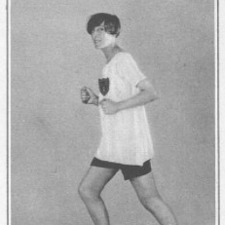
Violet Piercy
Violet Piercy (1889-1972?) was a pioneering distance runner and member of London Olympiades AC, a women’s athletics club. On Saturday 2nd October 1926, Piercy ran a marathon distance from Windsor to London (sometimes reported as 3rd October). The distance of Piercy’s solo run may only have been 20 miles. At the time, the term marathon was used quite loosely to describe any distance of 20 miles or more. Her time of 3:40:22 was retrospectively recognised by World Athletics as the first world best time for the women’s marathon.
In his article on the Playing Pasts website, Peter Lovesey writes that Piercy “became famous, speaking out repeatedly for women to engage in sport and take on endurance challenges, and eventually completed at least four marathons. She broadcast on BBC radio, was filmed for Pathé News, made headlines in the press and was said to have been watched by thousands when she did her solo runs. Yet within her lifetime she sank into obscurity and was forgotten until the present century except for those few inaccurate details of her first long road run.”
Read Peter Lovesey’s 3-part article on the Playing Pasts website.
Photo: The Sketch, 13th October 1926, British Newspaper Archive. The London Olympiades AC crest can be seen on Piercy’s shirt.
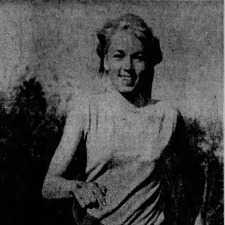
1960s rulebreakers in the marathon
“The 1960s marked the first quickening of a desire for women to be allowed to participate in the marathon and other road races. In the 1970s, this desire, this demand, grew into organised campaigns, but the seeds were sown in the 1960s when women in several countries began to break the rules and compete in men-only races.”
Some of the women who broke the rules & ran in marathons in the 1960s were Merry Lepper (USA), Dale Greig (UK), Mildred Sampson (NZ), Maureen Wilton (CAN) and Anni Pede (FRG). They have all had their marathon times recognised retrospectively as world bests by World Athletics. They paved the way for change to come in the 1970s.
Read my article about them.
Photo: Merry Lepper, San Bernadino County Sun, 19th December 1963, Newspapers.com
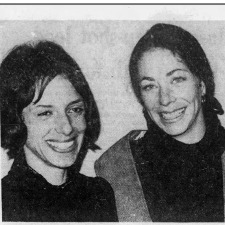
Nina Kuscsik
On 17th April 1972, women were for the first time officially permitted to run the Boston Marathon. It was the 76th running of the race which had been held since 1897. Nina Kuscsik (b. 1939) was one of the eight women who lined up that day. To qualify the women had to have the same standard as the men: to have run a marathon in under 3 and half hours. The race organisers thought that about 12 American women might qualify. Kuscsik was named as the favourite by the press who invariably described her as “the Long Island housewife.”
The first woman to run the Boston Marathon unofficially was Bobbi Gibb in 1966. Gibb ran it again in 1967 as did Kathrine Switzer who had managed to enter using her initials. Women had continued to run unofficially every year. Sara Mae Berman had been the fastest runner in the 3 previous years (1969-1971). Kuscsik had campaigned at the Amateur Athletic Union for women to be permitted to run longer distances.
The photograph from the Boston Globe on the morning of the race shows Kuscsik and Kathy Miller (née Switzer).
Kuscsik won the race in 3:10:26 and later that year she won the New York Marathon, returning to win it the following year. In 1972 she brought a successful lawsuit against the AAU to overturn the rule that women had to have a separate start line from men at races.
New York Road Runners Hall of Fame profile of Nina Kuscsik.
Photo: Boston Globe, 17th April 1972 – Newspapers.com
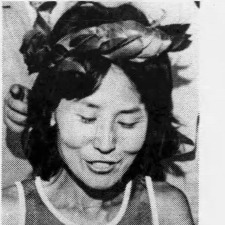
Miki Gorman
Michiko Gorman (1935-2015) overcame difficult childhood years in wartime and post-war Japan, moved to the USA in her 20s and began running in the 1960s.
She and Jacqueline Hansen trained together under Hungarian coach Laszlo Tabori in the early 1970s. On 2nd December 1973, Gorman set a world record at the Western Hemisphere Marathon in Culver City – 2:46:36. She took 3 minutes and 4 seconds off the previous best set by Cheryl Bridges at the same race two years earlier. Chantal Langlacé of France took the record down by another 12 seconds in October 1974, then Hansen gained the record running 2:43:54 at Culver City in December 1974.
The women’s world record was broken 14 times in the 1970s as marathon races which had previously banned women began to open up to them.
Gorman won the Boston Marathon twice in 1974 & 1977 and the New York Marathon twice in 1976 and 1977. In 1978 she set a half marathon world record. She retired from running in 1982.
Read Miki Gorman’s profile from the New York Road Runners Hall of Fame.
Photo: Michiko Gorman shown after winning the Boston Marathon for the second time, Los Angeles Times, 19th April 1977, Newspapers.com
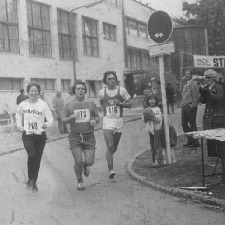
Jutta von Haase
On 14th October 1974, West German athlete Jutta von Haase (b. 1939), left in photo, won the first Berlin Marathon in 3:22:01. It was her first marathon and she had only run about 20km in training. When she turned up for a training run with the men, they were incredulous.
Von Haase was an experienced middle distance runner and was national indoor 1500m champion in 1970. Opportunities for women to run distance were limited.
It was the very early days of women being permitted to run marathons. Boston Marathon had officially admitted women in 1972. In the UK the change in the rules did not come until October 1975, a year after von Haase’s run.
There were just 10 women finishers in a field of 244 runners at the 1974 Berlin Marathon. (In 2019, there were 44,065 finishers.)
Von Haase went on to win Berlin again in 1976 but counts 1983 as her best performance when aged 44 she ran the fastest W40 time, finishing in 2:53:00.
In this article from 2003, von Haase gives an account of the race and how she came to run it.
The article and the photograph are from the germanroadraces.de website.
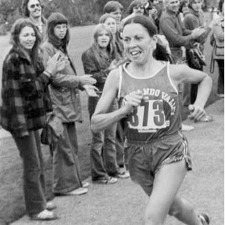
Jacqueline Hansen
Jacqueline Hansen (b. 1948) ran her first marathon in 1972 and set a world record of 2:43:54.5 on 1st December 1974 at the Western Hemisphere Marathon in Culver City. Another world record time followed on 12th October 1975 when she ran 2:38:19 at the Nike OTC Marathon at Eugene, Oregon.
Later, Hansen was one of the leaders in the campaign to get the women’s marathon, 5000m and 10000m into the Olympics programme. You can read about this in her book “A Long Time Coming”.
There is no doubt that the huge uptake in women running today would never have occurred without the pioneering women distance runners like Jacqueline Hansen who broke the mould in the 1960s and 1970s. Sometimes these women “gatecrashed” men-only races, sometimes they were one a handful of women in a field of more than a thousand men, sometimes they weren’t allowed to race. Many of them did not get the opportunities to compete that they deserved, but they became the activists who changed the rules, who battled with the athletics governing bodies, who brought the lawsuits and paved the way for all the women runners at half marathons and marathons today.
Read more about Jacqueline Hansen’s running career and campaigning.
Photo courtesy of Jacqueline Hansen – winning the 1975 Eugene OTC Marathon.
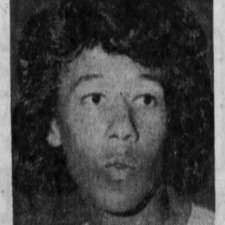
Marilyn Bevans
On 16th February 1975, Marilyn Bevans (b. 1949) became the first African-American woman to win a marathon at the Washington’s Birthday Marathon in Maryland with a time of 3:04:32. Later that year she was the first African-American woman to run a sub-3 hour marathon. In April 1975, she ran 2:55:52 at the Boston Marathon, finishing fourth. She finished second twice with progressively faster times. In 1977 her time was 2:51:12, finishing second to Mikki Gorman, and in 1979 2:49:56.
Bevans was a pioneer who faced discrimination as a woman and as a black woman. Before Title IX came in in 1972 there were very few opportunities for girls and women to do athletics, as schools and colleges were not obliged to give girls and women equal access to sport. Growing up she experienced segregation and limited opportunities.
I became aware of Marilyn Bevans through Gary Corbitt’s website which has a page on American black female marathon history.
There is a great interview with Bevans on the website, The Undefeated. When asked what her favourite race was, she replies:
“As a competitor, none of my races were my favorite because they had to hurt. When you’re running a marathon and you’re trying to go under three hours and you’re trying to place, you’re not taking pictures and waving at the crowd. You are banging along. It takes a lot. I’d go home and lay down for an hour or two just to alleviate the anxiety and stress of racing.”
In 2022, Marilyn Bevans was interviewed by Starting Line 1928 podcast.
Photo: The Baltimore Sun, 17th September 1977, “Bevans gains recognition in marathon circles”, Newspapers.com
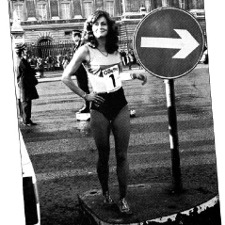
Leslie Watson
Leslie (sometimes written Lesley) Watson (b. 1945) was a Scottish national track and cross country champion in the 1960s and 1970s and became a member of women’s athletics club London Olympiades AC. As soon as women were permitted to run marathons in the UK, Watson started competing in them and became one of Britain’s most successful marathoners of the 1970s and 1980s. Watson’s first marathon was the Masters and Maidens Marathon in Guildford on 19th October 1975. She finished third and was also third in the Barnsley Marathon. In 1976 she won both races. From 1975 to 1985, Watson was at the top of the field in the UK winning dozens of races. According to the Scottish distance running history website she won 52 marathons in that period.
Watson is also a significant figure in ultrarunning history. In its heyday, London to Brighton was one of the best known ultra races, attracting runners from many countries. Started in 1951 it did not admit women until 1980. In 1972 Dale Greig ran London to Brighton unofficially. In 1979, Leslie Watson was one of three women, Watson, Lydia Kirk of Great Britain and Ruth Anderson of the USA, who ran the race unofficially. The following year women were finally admitted.
Watson subsequently set ultra world records at 50 miles & 100k.
Read more about her career.
Photo: London Marathon programme 1981 which described Watson as “the Queen of the Roads”.
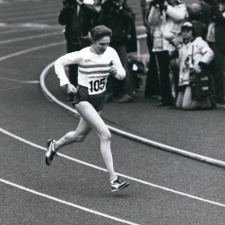
Joyce Smith
When Joyce Smith (b. 1937) began competing in the 1950s the furthest distance women could run in international competition was 800m. As longer distances opened up for women she set the 3000m track world record in 1971; won the 1972 international cross country title; and reached the 1972 Olympics 1500m semi-final.
Smith was 38 by the time women were permitted to run marathons in the UK in 1975. She ran her first marathon in her 40s in 1979, setting a British record.
She won the first two Tokyo marathons (1979 & 1980) and the first two London marathons (1981 & 1982). At the age of 46 she competed for Great Britain in the first women’s Olympic marathon in 1984.
Interviewed on the Marathon Talk podcast, Smith said: “Looking back I wish I’d been able to run marathons when I was in my thirties. What would I have achieved? We’ll never know. I was just unfortunately a little bit before my time perhaps.”
Read more about Joyce Smith.
Photo: Joyce Smith winning the second Tokyo Marathon in 1980.
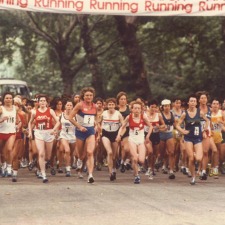
London International Women’s Marathon 1980
This was the third marathon in the Avon International Running Circuit, the brainchild of Kathrine Switzer. It’s timing was significant as it was held a few months before the International Olympics Committee was due to decide whether to add the women’s marathon to the programme for the Los Angeles Olympics in 1984.
The race was held on 3rd August 1980 and attracted top marathoners including Joyce Smith (UK), Joan Benoit, Gail Volk, Nancy Conz (USA) and Lorraine Moller (New Zealand) who won the race.
Switzer says in her book, Marathon Woman:
“Women’s marathon running was an established global sport. London was the proof.”
Read my article about the race. American runner Maureen Fitzpatrick took part in the race and it was her first marathon. Read Maureen’s story.
Photo courtesy of Kathrine Switzer
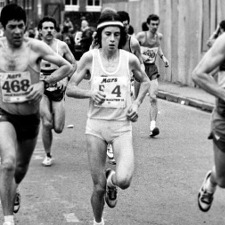
Sarah Rowell
Sarah Rowell (b. 1962) competed for Team GB in the first Olympics women’s marathon in Los Angeles in 1984 and set the British marathon record at the London Marathon on 21st April 1985.
Rowell competed in four consecutive years at the London Marathon improving her time and finishing position each year. Her time in 1982 was 2:54:29. Four years later in 1985, she finished second behind Ingrid Kristiansen in 2:28:06, a British record. Kristiansen set a world record. Rowell’s time would be well within the British Olympics selection standard for Tokyo 2021 – 2:29:30.
Her 1984 London Marathon time (2:31:28) qualified her for the Los Angeles Olympics where she finished 14th in 2:34:08.
Rowell went on to compete at a high level in fell running, winning the Three Peaks, Ben Nevis, Wasdale and Borrowdale fell races in the UK and competing for Team GB at the World Mountain Running Trophy four times, finishing second in 1992.
She has also served athletics in many roles and is currently a Council Member of the World Mountain Running Association.
Watch a video of Rowell finishing the London Marathon in 1985.
Photo: courtesy of Graham MacIndoe
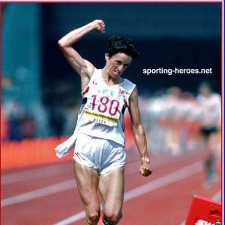
Priscilla Welch
On 10th May 1987, British marathon runner Priscilla Welch (b. 1944), aged 42, set a W40 age group record at the London Marathon, running 2:26:51, a record which stood for 21 years. She finished second that day and went on to win the New York Marathon later that year.
34 years later, her London Marathon time is still the 7th fastest by a British woman.
Welch was an unlikely elite athlete, having smoked a pack of cigarettes a day until she took up distance running at 35. She started running after she met her future husband, David, who encouraged her to try it as she was feeling bored and miserable.
She and her husband joined Ranelagh Harriers in 1983/84. Read an interview with Welch on the club website.
Photo: George Herringshaw at sporting-heroes.net – shows Welch crossing the finish line in 6th place at the Los Angeles Olympics in 1984
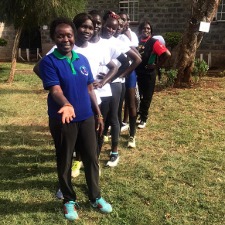
Tegla Loroupe
On 6th November 1994, Kenyan Tegla Loroupe (b. 1973)became the first black African woman to win a major marathon when she ran the New York Marathon in 2:27:37.
Loroupe went on to win many more marathons, including Rotterdam, Berlin and London. In 1998 at Rotterdam she set the marathon world record (2:20:47) which she bettered the following year at the Berlin Marathon (2:20:33). She held the record for 3 years.
“I fought my way through not for myself, but for other women who couldn’t believe in themselves. For them to see that there was someone who has been there fighting for them, to make a difference.”
Loroupe has been able to use her running success as a platform to make not only a wider contribution to the sport of running, but also to build trust between communities in Kenya, empower women and girls and create opportunities for athletes, including refugee athletes, to train. She founded the Tegla Loroupe Peace Foundation in 2003.
Loroupe was instrumental in creating the first-ever refugee Olympic team for the 2016 Olympics in Rio de Janeiro. She was the team’s Chef de Mission and has the same role for the Tokyo Olympics.
You can find out more about the work of the Tegla Loroupe Peace Foundation on its Facebook page.
Photo: Tegla Loroupe Peace Foundation, March 2021: Loroupe with refugee athletes at her training camp, Ngong, Kenya
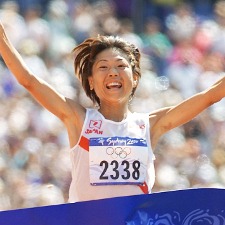
Naoko Takahashi
On 30th September 2001, Naoko Takahashi (b.1972) became the first Japanese woman to break a marathon world record. When she ran 2:19:46 at the Berlin Marathon, she became the first woman run a sub-2:20 marathon.
The previous record had been set by Tegla Loroupe of Kenya.
Takahashi did not hold the record for long as just 7 days later Catherine Ndereba of Kenya ran under 2:19 at the Chicago Marathon.
In 2000, Takahashi won Gold in the marathon at the Sydney Olympics, beating Tegla Loroupe.
In March 2021, the Tokyo Olympics and Paralympics Organising Committee appointed 12 women to join the committee including Takahashi.
You can read about her career and watch a video of the Olympic race on the Olympic Channel.
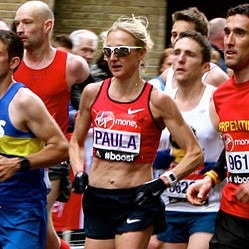
Paula Radcliffe
On 13th April 2003, Paula Radcliffe (b.1973) set a marathon world record at London – 2:15:25. Her world record stood for 16 years until it was broken by Kenyan Brigid Kosgei at the Chicago Marathon in 2019.
Between 2002 and 2008, Radcliffe won the London Marathon three times and the New York Marathon three times. In 2005, she won Gold in the marathon at the World Championships in Helsinki. She set a world record for 10k in 2003 (30:21) and held many British records.
See Radcliffe’s stats on the World Athletics website.
The picture shows Radcliffe running in her last London Marathon in 2015, which marked her retirement from competitive running.
Photo: Wikimedia Commons
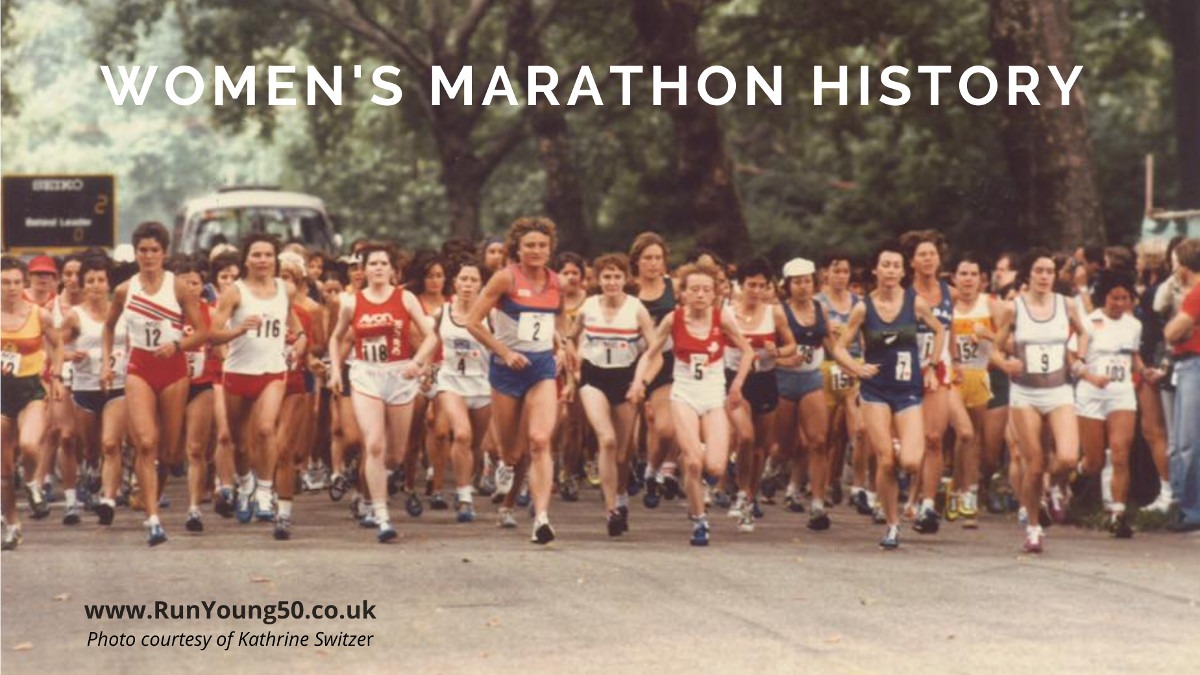
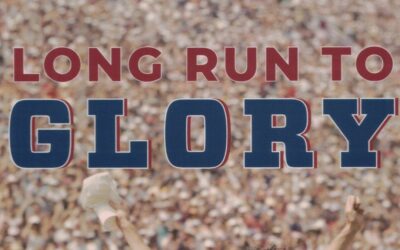
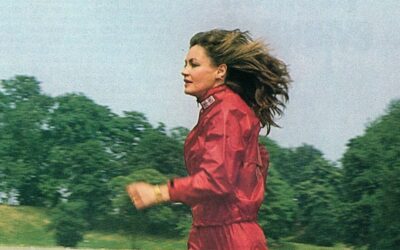
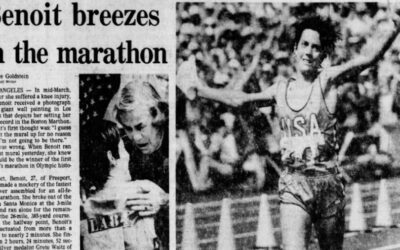
0 Comments
Trackbacks/Pingbacks